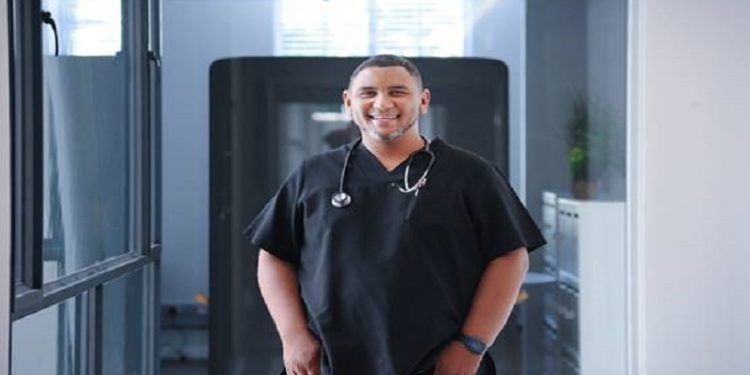They say every dark cloud has a silver lining. That saying really holds true when one considers the life, experience, and achievements of Dr Randall Ortel, a family physician and occupational medical practitioner, who hails from the drug and gang infested Manenberg in the Cape Flats.
Ortel, reportedly the first medical doctor of colour from Manenberg, will double his feat today, Thursday 15 December, when he graduates for his master’s in medicine from the University of Cape Town (UCT), another first for Manenberg. He is currently a lecturer at the Family Medicine Department of UCT, and also attached to Groote Schuur Hospital.
When he applied for tertiary studies, he was not quite sure as to what career he was going to pursue as all opportunities were open to him from the onset. However, with the help of career guidance teachers at high school he did capability testing, which had showed that he needed to be in a caring and advocacy career.
“I literally applied for every possible career, got accepted for everything I applied for, but chose medicine as per my father’s words ‘people will always get sick’,” he says. His father’s friend was a well-known doctor practicing in Manenberg then, Dr Abu Mowlana. “Observing him as a positive role model had an impact on my decision to choose this path.”
Ortel is positive about his community: “Manenberg is one of the best communities to hail from – very supportive, motivating, nurturing culture, upholding the ‘coloured’ culture but unfortunately the minority movements of gangsterism and drugs seems to dominate.”
He says his community is happy to have him around as he shares his skills, knowledge and attitudes freely. In his community he plays a role in intervening between gangs, most of which he grew up with, attended school, and went to church with.
When he graduated as a medical doctor in 2010 “Everyone was truly and honestly excited, proud, supportive” to him. “As a student I was a taxi driver on weekends and university vacations to generate funds for my bursary shortfalls at times, books, travelling fees and day-to-day needs as a young person. I was recognized as a taxi driver in the community and when the news broke I qualified as a medical doctor people were obviously in disbelief but as the story unfolded they realised I was a medical student and only drove a taxi part-time. People were then happy for the so-called taxi driver turned medical doctor in Manenberg.”
His father initially funded his studies, but fortunately his mom was employed as a factory worker at Rex Trueform and belonged to the South African Clothing Textile Workers Union (SACTWU). “We applied for a bursary, and it was awarded to me for quite a few years during my medical training. Minister Ebrahim Patel and Fachmy Abrahams from SACTWU were instrumental in assisting me with the bursary. I also received a bursary from the HCI/Golden Arrow Bus company foundation, the Dr Aadiel Moerat bursary fund also supported me for a year or two. The remainder of my medical career I funded with the money earned while driving a taxi.”
People in Manenberg are honestly proud of him as he is approachable and tangible, partake in many community activities and strive to have a positive influence wherever he can. He is also the vice-chairperson of the Manenberg Aftercare Centre.
Ortel say the master’s in medicine is going to add lots of value, especially advocacy. “The principles of family medicine resonate with me,” he says.
Though he doesn’t know the exact impact of his influence in the community, Ortel says there are a lot more nurses, paramedics, and physiotherapists among others from the community. “I started a Dr Randall Ortel Foundation for Manenberg students only who want to become doctors. To date we have another qualified doctor who finished two years ago at Stellenbosch University, one fifth and one fourth year medical students both at Stellenbosch University, all hailing from Manenberg.”
He fondly remembers doing his internship and community service at GF Jooste Trauma Hospital Complex in Manenberg. “Serving my own people was great and I learnt so much.”
How does gang violence affects his practice? “Violence and gang violence is in the minority and does not persist all the time – it’s sporadic but when gang violence happens it impacts one’s movement – you have to limit your activities – all in the fear of being caught in the crossfire of gangs.”
“People all know me including the gangsters – most of us were all in school together, played sports in the community or even attended church together.”
His future plans ‘definitely’ involve academia and to pursue a PhD sometime. “I would love to have a shot at becoming the next minister of health in the province and then hopefully nationally,” he says. A few short term goals is to become the CEO of a government hospital to be built in Manenberg in the near future, connect the community with UCT, create opportunities for other youngsters – learn with or from the new doctor generation that will be discovered from Manenberg.
His dream is that the professional or educated people from Manenberg come together and have more input and influence in the community. “We need to stop the supply of youth to the underworld activities that terrorise or traumatise our communities. Let’s put out more good deeds. Manenberg is still the place to be.”
Source: University of Cape Town






 WhatsApp us
WhatsApp us 

